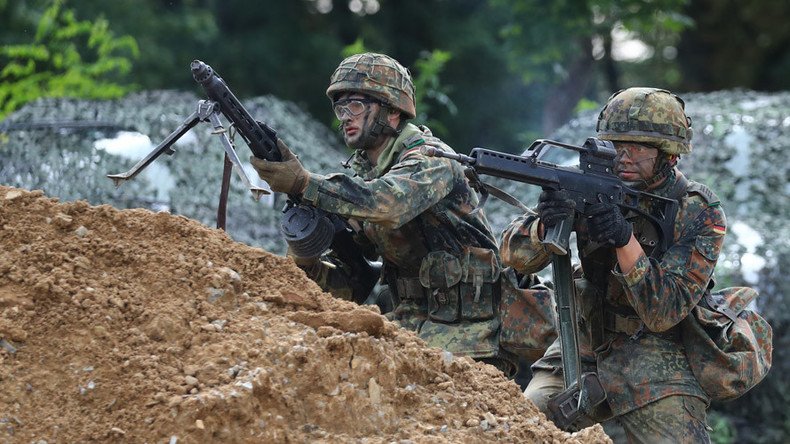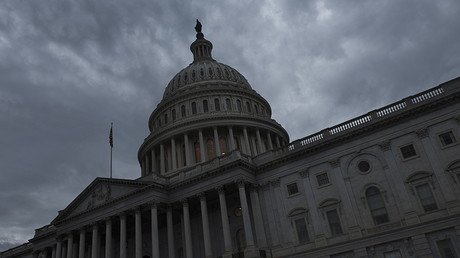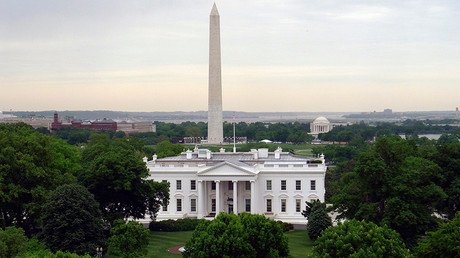‘A clear no’: Germany’s Social Dems slam Trump’s 2% NATO defense spending calls

The leaders of Germany’s Social Democratic party (SPD), part of the ruling coalition, have denounced Donald Trump’s calls for NATO members to meet the defense spending target of 2 percent of GDP, accusing Chancellor Angela Merkel of kowtowing to the US leader.
"We say a clear no to the '2 percent target' of Trump and the CDU/CSU [Merkel’s Christian Democrats and their Bavarian branch]. It's not only unrealistic, it is simply the wrong goal," SPD leaders Martin Schulz – a candidate for chancellor in the upcoming elections – and Thomas Oppermann wrote in an essay for the Funke Mediengruppe newspaper chain.
The pair also criticized any potential move in this direction, as Berlin would have to almost double its current defense spending to keep up with NATO requirements. At the moment, Germany spends around €37 billion (US$43.6 billion) on defense, or 1.2 percent of its budget.
The consequences could be more threatening than anybody knows, Schulz and Oppermann said. The pair wrote that if defense spending were doubled, Germany would become the largest military power in Europe, which they are sure “nobody would want - just because of our past. It makes no sense for the future either.”
What the SPD leaders offer instead is a strong European defense union.
“Already from an economic point of view, it makes a lot of sense [to conduct] closer joint work between the EU countries: 27 armies with 27 procurement procedures are currently buying the same weapons systems in Europe. While the US manages 30 various weapon systems, the EU member countries have 178 different weapon systems for their 27 armies!”
The text also cited another perceived downside of the NATO plan. According to estimates mentioned by Schulz and Oppermann, “the lack of cooperation between the [EU] member states [already] leads to annual costs ranging between €25 billion and €100 billion. We should invest these resources in research and technology rather than in the maintenance of national parallel structures,” the essay stated. The ultimate goal would hence be a “joint European army,” the statement added.
The politicians criticized Merkel and the CDU/CSU for “making themselves small vis-à-vis Donald Trump when they answer his provocations around the 2 percent target by saying, 'Okay, fine, we'll put in more money,' as if we didn't have any better ideas what to do.”
German Federal Defense Minister Ursula von der Leyen (CDU) has already commented on the essay, condemning the SPD criticism as “lies” if Schulz and Oppermann “believe that security in Europe is cheaper than under the protective roof of NATO," the minister told the Funke Mediengruppe, going on to brand the socialists’ election campaign as “totally messed up.”
The latest tensions in the German government show a wedge between the coalition parties, namely Merkel’s conservative CDU/CSU party and the socialist SPD.
It comes ahead of the September 24 elections, which Merkel’s party is projected to win with up to 40 percent of popular support, Reuters reported.
Germany has come under fire from Trump, who tweeted back in May about the “massive trade deficit” that the US has with the country, and also blasted Berlin for “paying far less than they should” for NATO and military issues.
We have a MASSIVE trade deficit with Germany, plus they pay FAR LESS than they should on NATO & military. Very bad for U.S. This will change
— Donald J. Trump (@realDonaldTrump) May 30, 2017
Back in March, Merkel pledged to do her best to reach by 2024 what Trump calls a “fair share” in NATO spending. Other German officials weren’t as enthusiastic, though, with Defense Minister von der Leyen calling for a so-called “activity index” measuring each NATO country’s involvement in foreign missions. Her logic was that those doing more for NATO abroad should be paying less. German Foreign Minister Sigmar Gabriel stated in March that he was "concerned that politicians make public promises that they can't fulfill later on.”
In June, the bloc’s head, Jens Stoltenberg, declared that the European NATO allies and Canada will spend around $12 billion more on combined defense spending, and that this will be the third consecutive year of stepping up the defense budget.
Stoltenberg said that he welcomes the "strong focus of Trump on spending and defense burden-sharing," noting, however, that the move benefits all states involved, and isn’t aimed at pleasing Washington.
European Commission President Jean-Claude Juncker seemed to disagree with the NATO chief, though, stating as early as in February that Europe mustn’t be provoked by the US to increase its military spending, which “has been the American message for many, many years.”
“I am very much against letting ourselves be pushed into this,” the official said.
In June, Juncker said that the time is over for “outsourcing” the protection of Europe. The region doesn’t have “to look much further than our doorstep to see that war is not a thing of the past,” the official stated.
Only five out of 28 NATO nations now meet the 2 percent of GDP spending mark — the US, the UK, Estonia, Greece and Poland – with Washington spending about 2.5 times more than the rest of the allies combined.















